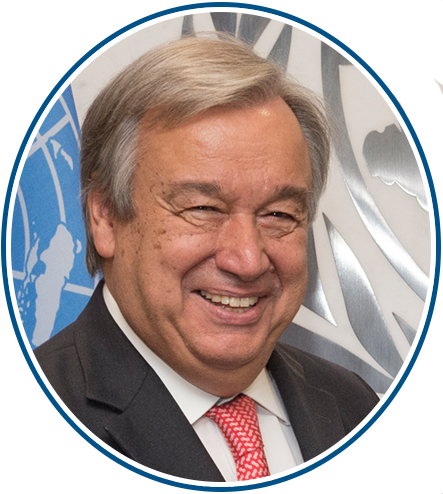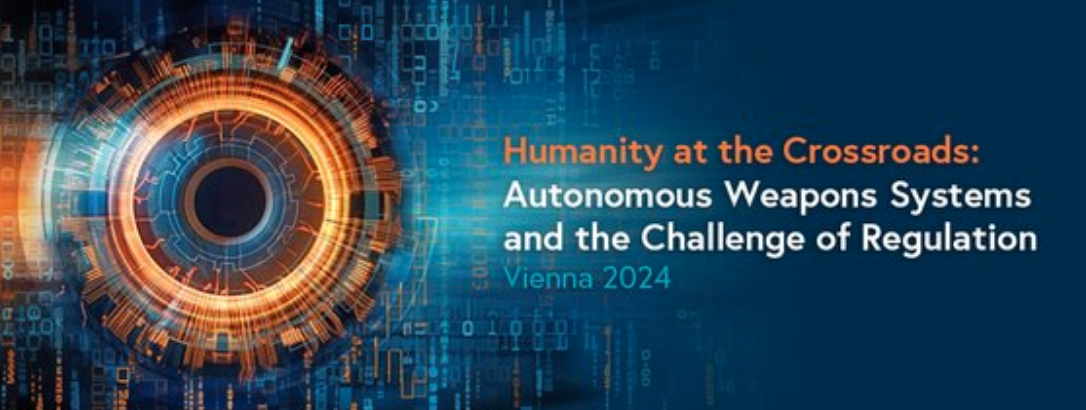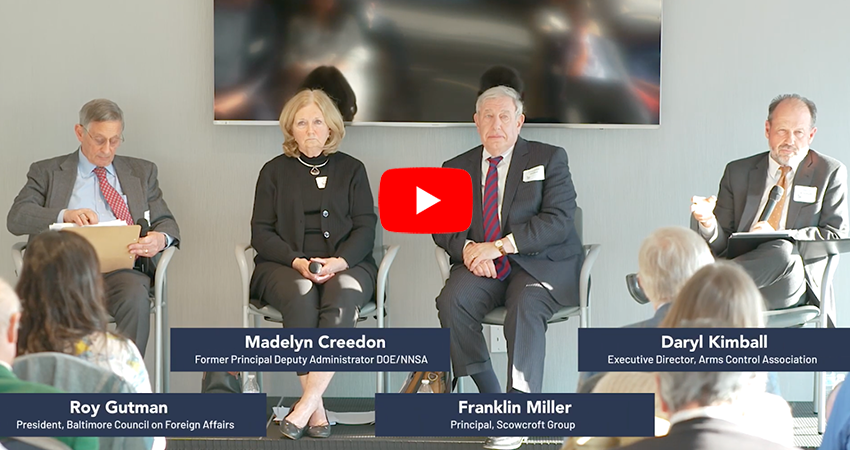Inside the Arms Control Association
May 2024
This year at ACA’s annual meeting, we will delve into some of the most pressing arms control, nonproliferation, and disarmament challenges facing the nation and the world today.

We are honored to announce that UN Secretary-General António Guterres will deliver special remarks via video on the nuclear threat and critical steps to reduce nuclear dangers.
One of the leading proponents of effective nuclear arms control and more sensible U.S. nuclear weapons policies, Congressman John Garamendi (D-Calif.), will deliver the opening keynote address. He is a member of the House Armed Services Committee and co-chair of the bicameral Nuclear Weapons and Arms Control Working Group.
With our luncheon keynote address, we’ll get an "Update on U.S. Nuclear Weapons Policy and Future Directions for Arms Control" from Pranay Vaddi, Special Assistant to the President and Senior Director for Arms Control, Disarmament, and Nonproliferation at the National Security Council.
Our expert panels include:
- "Looming Decisions on U.S. Nuclear Force Size and Spending" with Hans Kristensen (Nuclear Information Project, Federation of American Scientists); Madelyn Creedon (Congressional Commission on the U.S. Strategic Posture), and W. J. Hennigan, the writer behind The New York Times special series of op-eds “On the Nuclear Brink.”
- “Achieving More Effective Implementation of U.S. Arms Transfer Policy,” discussing the controversy around Israel’s bombardment of civilians in Gaza using U.S.-supplied weapons.
- "Preventing Further Proliferation in the Middle East,” discussing options to constrain Iran’s sensitive nuclear activities in the wake of the U.S. withdrawal from the 2015 Nuclear Deal and the potential risks of a U.S.-Saudi nuclear cooperation deal.
Your Arms Control Association team is working hard to plot a course that gets us back on course and back from the nuclear brink. Our Board Chair Tom Countryman will outline our proposal with special remarks on "Charting Future Paths for Nuclear Arms Control and Disarmament.”
You won’t want to miss this year’s conference.
Secure your seat by registering now, and please consider becoming a meeting sponsor to help ACA address these and other difficult challenges, reach new audiences, and train the next generation of arms control leaders.
| Register to Attend our 2024 Annual Meeting |
Does the United States Need More Nuclear Weapons? No.
ACA’s executive director Daryl G. Kimball debated this question at an event hosted by the Baltimore Council on Foreign Affairs on April 24 with two members of the Congressional Commission on the U.S. Strategic Posture.
CWC Coalition Calls for Response to Allegations of Russian Treaty Violations
Last week, the United States formally accused Russia of using "the chemical weapon chloropicrin [a banned choking agent] against Ukrainian troops," as well as engaging in the use of riot control agents “as a method of warfare” against Ukrainian soldiers on the battlefield, which is strictly prohibited under the Chemical Weapons Convention. The U.S. charges follow months of unconfirmed reports and diplomatic statements of concern about Russian violations of the CWC in Ukraine.
In response, the Chemical Weapons Convention Coalition, hosted by ACA, issued a joint statement signed by more than 35 experts and organizations “calling upon CWC states parties to direct the OPCW to open an investigation into these allegations.” The CWCC also called on both Russia and Ukraine to fully and immediately cooperate with the OPCW in its investigation.”
ACA Represented at Vienna Conference on Autonomous Weapons

ACA senior visiting fellow and Board Member Michael Klare joined 1,000 other governmental and nongovernmental delegations from about 140 countries in Vienna April 29-30 at a conference titled: “Humanity at the Crossroads: Autonomous Weapons Systems and the Challenge of Regulation.”
Michael also organized and spoke at a special side event on “Artificial Intelligence, Automated Battlefield Management Systems, and the Risk of Inadvertent Nuclear War.” The session, involving experts from the European Leadership Network and the Austrian Physicians for the Prevention of Nuclear War examined the risk posed by automating battlefield command-and-control systems and equipping them with algorithms intended to calculate enemy moves and intentions, select the optimal countermoves, and dispatch attack orders—all with minimal human oversight.
Russia Renews Nuclear Rhetoric: Take Action
While talks on nuclear risk reduction and arms control are on hold, on May 6, Russia said it would hold drills simulating the use of sub-strategic nuclear weapons in response to comments by senior European officials about possibly deeper involvement in the ongoing Russian war on Ukraine. The Kremlin’s invocation of nuclear threat rhetoric has added to rising tensions.
Now, is the right time to write to your congressional representatives urging them to condemn nuclear threats of any kind and to express their support for U.S. efforts to engage Russia and China on nuclear arms control. Please ask your congressional representatives to co-sponsor a resolution introduced by Rep. Bill Foster in the House (H. Res. 1079) and Senators Ed Markey and Jeff Merkley in the Senate (S. Res. 593).
The resolution “calls for immediate cessation of nuclear saber-rattling and nuclear escalatory rhetoric from the Russian Federation” and also "calls on the Biden administration to continue to pursue nuclear arms control and risk reduction dialogue with the Russian Federation to maintain strategic stability, ensure the conflict in Ukraine does not escalate to nuclear use, and avoid an unrestrained nuclear arms race."
Please write to your Representative and Senators now.
U.S. Arms Transfer Policies and the War in Gaza
The United States has a well-established framework of laws, regulations, and policies to ensure U.S. military assistance is not used in ways that violate international humanitarian law. Last week, the administration delivered a report to Congress assessing whether several countries, including Israel, that are involved in active conflicts, have, or have not, used U.S.-supplied weapons in a manner consistent with U.S. values and international law.
The report said that U.S. weapons might have been used in violation of humanitarian law and that Israel has acted in ways that have blocked U.S. humanitarian assistance, but did not make a specific enough finding to trigger punitive action against Israel.
See ACA’s “Statement on Biden Administration's NSM-20 Finding on Israel.”
ACA In the News
- Executive director Daryl Kimball spoke to the titular question of “In deterrence we trust?” in the Christian Science Monitor, May 2.
- The National Interest recalled comments by National Security Advisor Jake Sullivan at the 2023 Arms Control Association Annual Meeting in recommending that we “Don’t Mind the Missile Gap,” May 2.
- The Diplomat noted Assistant Secretary of State Mallory Stewart’s response to “Is the US Finally Taking China’s NFU Seriously?” from our exclusive interview with her in the May 2024 issue of Arms Control Today, April 27.
- Kimball addressed “The nuclear threats that loom over Iran and Israel” in the Washington Post following attacks between the two states, April 25.
- The Daily Wire looked back to Jaganath Sankaran’s May 2022 feature story in Arms Control Today in reporting last month that “Russia Vetoes UN Resolution To Reaffirm Ban On Nuclear Weapons In Space,” April 25.
- Policy director Kelsey Davenport appeared on BBC Radio 4 to discuss Iran’s Nuclear Capabilities (beginning at 32:34), April 17.
- The Telegraph spoke with Davenport in asking “How close Iran is to building nuclear bombs - and why no one can stop them,” April 17.

